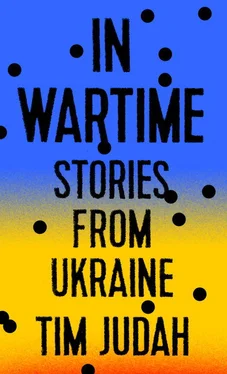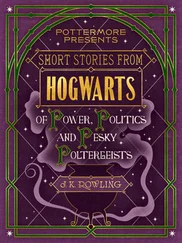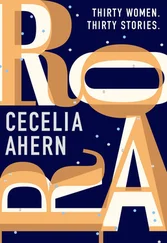On the way out of town there is a big Ukrainian checkpoint and military position at the crossroads in the district of Cheryomushki. In Popasnaya they said that the Ukrainians had been firing at them from here. The rebel lines were more than a kilometer away. The crossroads is close to an area of low-rise apartment blocks, just like the ones in Popasnaya. Many were damaged and had holes in the roofs from shelling. The Ukrainians claimed the rebels and their Russian backers were trying to hit the checkpoint. I wanted to talk to someone but couldn’t see anyone at all. Suddenly, in the distance, I spotted a woman and ran to catch up with her. Ludmila, aged sixty-three, was walking home with a shopping bag. I asked her if anyone else was here, living in these hundreds of apartments. In her block, she said, “there is a woman on the first floor and me.” She had seen light in two windows in other blocks recently. She had lived in the basement for two weeks when shelling was bad. The electricity and gas had been cut off, but now they had been restored, though the running water had not. She told me that she had a daughter-in-law and grandchildren who were living somewhere safe and they had asked her to come, but so far she had refused. “I lost my husband when I was thirty-five,” she said, and a few years ago her only son had died of lung cancer, so she had thought to herself that if she was killed “and buried between them, it would make no difference.”
Civilians were suffering, as they do in all wars, but in this one older people were suffering the most. The morale of soldiers on both sides was high, and their leaders were thinking and talking of eventual victory rather than a peaceful end to the war. The rebels could not survive without Russian military support, but with it the Ukrainians could not defeat them. The war was thus both one between Russia and Ukraine and at the same time contained elements of civil war in the east. Many pro-Ukrainians tried to deny this because it complicated their simple picture of Russian aggression and terrorists, but for anyone who had been on both sides of the line, it was evident. That was not to deny Russian involvement though, and, as Valentin Fedichev, a proud Ukrainian army colonel who briefed me, said, even in a nightmare “we never thought we could be attacked by Russia.” He was an Afghan war veteran and, as he pointed out, an ethnic Russian. What Vladimir Putin had done, he said, was to commit an act of “geopolitical treachery” against Ukraine. Everyone was waiting to see what he would do next.
Before the war, Olena Maksymenko, a tall twenty-nine-year-old, loved to write and travel. “I traveled a lot, in the Caucasus, Georgia, Mongolia, Baikal. I was also interested in ancient history, archaeology and mythology.” Not many Ukrainians are travel journalists and poets, but Olena was carving out a nice career and name for herself here.
But, as for many middle-class educated Ukrainians, something changed for her with the Maidan revolution. Like so many others, all she wanted for Ukraine was for it to be a normal European country, not one that continued to linger, as it had done since independence in 1991, in the gray zone between Russia and the rest of Europe, all the while crushed by a culture of economic and political corruption that left poor a country which should be rich. So, Olena’s poems became political and she read them from the stage on the Maidan.
In March 2014 she went with colleagues to write about what was happening in Crimea. Close to the border she was picked up, or kidnapped, by people she described as “just guys with guns.” They were, she said, Cossacks, Berkut and Russian soldiers. They threatened to kill her, pointed a gun at her and fired, though it was not loaded, hit her and chopped some of her hair off. “They said I was an agent of the USA and they tried to get information from me about other journalists. Three days later, I was released.”
When she came back from Crimea she discovered that one of her best friends, with whom she had spent the Maidan months, had committed suicide. By complete chance this moment in her life coincided with a writers’ residency she had won, organized before the revolution, in Latvia. There, a novel about her friend and the Maidan simply poured out. She was angry. She trained to fight, but she told me that only women with the right connections were being allowed to do so. “If there is a choice between a woman with training and a man without, they will choose the man.” Women like her, she complained, were being shunted into HQ paper-shuffling jobs or detailed to cook for soldiers.
We traveled together to Pervomais’ke, [1] This is not the same place as Pervomaysk, described in “Towns at War.”
close to Donetsk airport. She was attached to a group of volunteer medics based in what had been a hotel before the war. Here, the doctors had set up a first-aid treatment and evacuation center for soldiers injured in the fighting. All the medics, including medical students who were doing time at the front, were enthusiastic and fired up by the cause of doing their bit to defend Ukraine. Standing behind the hotel reception desk was Oleksiy Reznikov, aged twenty-two, who had a shelf of small bottles of different-colored inks behind him and above his Kalashnikov. “This is a war we need to fight, and everyone needs to find their niche,” he told me. His was that of frontline tattooist. “It raises morale… and then the fighters do a better job.” Soldiers and medics were having him tattoo them with their blood groups and nicknames, and some with patriotic Ukrainian themes and symbols.
From here, we could hear fighting, but the intensity was much reduced since the ceasefire of February 15, 2015. Bored, Olena was filing stories and collecting more which might appear in another novel. From her childhood, she told me, she had thought that it would be amazing to be a war correspondent and “that I would go to foreign wars… but unfortunately war came to me.”
In Kiev I sat with a senior security official whom I know. We were talking about the various scenarios facing Ukraine in the next few months. Then he mused that even though Ukraine had become an independent state when the Soviet Union had collapsed, it was not something that Ukrainians had fought for. Now they were fighting “a classical war of independence… we have to force, or persuade, the Russians to consider us a separate people, entity and state.” And he added, “but wars of independence have a second step and that is a war for borders.”
In rebel-held Donetsk, I met Anna Iureva, aged eighty-seven. Anna is a tiny, sprightly, gray-haired woman. For the last eight months she and her family had lived in a dingy nuclear bomb shelter. With the ceasefire most of the people who stayed here had gone home, but some, like Anna, were stuck. She and her family had fled from their damaged house a few minutes’ walk away from the hotel-cum-field-hospital in Pervomais’ke.
Anna said that she would like to go home but “fighting is constant there,” and anyway, she did not want to return while it was still under Ukrainian control. “They did a lot of harm to us. How many people have they killed? How many homes have they destroyed?” she asked angrily. Then she took me into a side room where her relatives and others slept in cramped bunk beds. It was incredibly hot, because here her forty-three-year-old granddaughter, who has Down’s syndrome, was sitting right in front of a fan heater. Anna showed me a can with oil and a wick that they used for light when the electricity went off because they had run out of candles, and which she said gave off a horrible, choking smoke. Then she gave me a sheaf of small and tidy sheets of paper on which she had transcribed her poems.
Читать дальше












